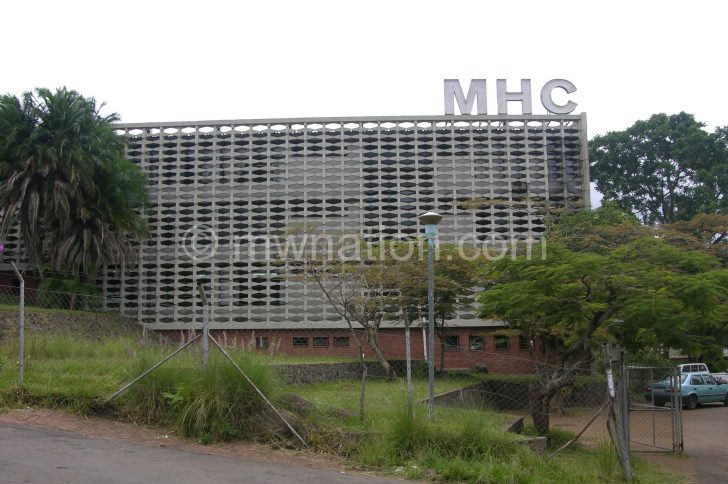MHC increased charges illegal?
Recent controversial increases of house rentals and ground rates by the Malawi Housing Corporation (MHC), without gazetting them, have been described by a private practice lawyer as illegal, and not binding on MHC’s tenants.
Asked to comment on a revelation that MHC has besides increasing house rentals, also silently increased ground rates by an average of 100 percent, Justice Link executive director Justin Dzonzi, said as a matter of administrative law, which prescribes how certain things are supposed to be done, but they are not done as prescribed, decisions such as the ones made by MHC become null and void.

Dzonzi said in the case of MHC, the tenants and plot holders are not obliged to pay the newly-introduced rentals and ground rates if they were not gazetted.
“And for MHC, I don’t see a reason they would want to implement something that is illegal. They can start a process to have this gazetted, it is not a difficult process,” said Dzonzi.
He said even in the absence of law, the fair trade rules require MHC to notify their clients in good time about the changes to enable them make decisions whether to maintain the contracts between them and MHC.
MHC spokesperson Ernestina Lunguzi, however, insisted that they were mandated by law to make by-laws. She said they informed their clients privately, insisting that is how they deal with their plot holders.
True to Lunguzi’s insistence, Section 16 of the MHC Act states that the corporation may, subject to prior approval of the Minister, make by-laws regulating any of the following matters—

(a) The procedure governing the allocation of the corporation’s houses to applicants and the assessment of rents to be paid.
(b) The rates of interest, charges and conditions to be contained in agreements made by the corporation in respect of premises sold upon deferred terms of payment [and]
(c) The rates of interest, charges and conditions attaching to loans to persons for the construction of dwelling houses.
However, Section 17 (1) of the General Interpretation Act of the Laws of Malawi, states that no subsidiary legislation shall come into operation unless it has been published in the Gazette.
And according to the Act, interpretation of subsidiary legislation means a proclamation, regulation, rule, order, notice, by-law or other instrument made under any written law and having a legislative effect.
Lunguzi confirmed that the corporation has, effective July, adjusted the ground rates by an average 100 percent, adding that the rental hikes, which stirred controversy and forced the corporation to rescind its decision after tenants protested, would be implemented by September 1.
She insisted that the corporation is mandated to revise the rentals and ground rates on its own, every five years.
However, Consumers Association of Malawi (Cama) executive director John Kapito, in an interview on Wednesday, faulted MHC for not issuing a public notice, arguing that it is always necessary for public institutions to issue public notices in matters of this nature.
“I have no problem with them adjusting the ground rates as long as all procedures as required by law were followed. Whether these new charges are unreasonably high is subjective, there are businesses that are occupying MHC land, making big profits, but they have been paying those low rates,” Kapito said.
He said informing the public would help those concerned plot holders in planning and also the public would appreciate what is going on.
Lunguzi, justifying the adjustment, argued that MHC carries out various projects that require substantial investments, including maintenance of roads and clearing of drainages, adding that all these would require enough funds.
A plot holder, who opted for anonymity, said MHC, being a public institution wholly owned by government, must learn to make its decisions, especially those that concern their clients, public.
MHC recently gave notices to its tenants an overall 43 percent adjustment, but the tenants protested and threatened nationwide demonstrations.
Earlier in June, the MHC tenants also threatened to drag the corporation to court when it communicated that it was going to hike house rentals by an average 48 percent.
It was after the protest that the overall increase percentage was reduced to 43 percent, which the tenants still protested, forcing MHC to rescind its decision until further notice.
But Lunguzi said as per their practice, they have since communicated to their tenants individually, informing them that the rental adjustments would be effected September 1.
MHC tenants’ association spokesperson Goodnews Mphande said in an interview on Thursday a meeting between MHC management and the new minister of Lands, Housing and Urban Development, Anna Kachikho, is being arranged over the matter. He warned that the tenants would not accept the new rentals if this meeting does not take place before September 1.
MHC chief executive officer Eunice Napolo told journalists in Blantyre mid-June that her institution decided to adjust rentals due to rising costs of operations and sustainability of its functions.
Napolo said revenues from rentals MHC was making were not enough to maintain the houses, arguing that the increase in rentals was necessary for the corporation to continue maintenance works and construction of new houses.
MHC has several plots across the nation and about 6 000 houses. MHC has been selling most of its houses.





